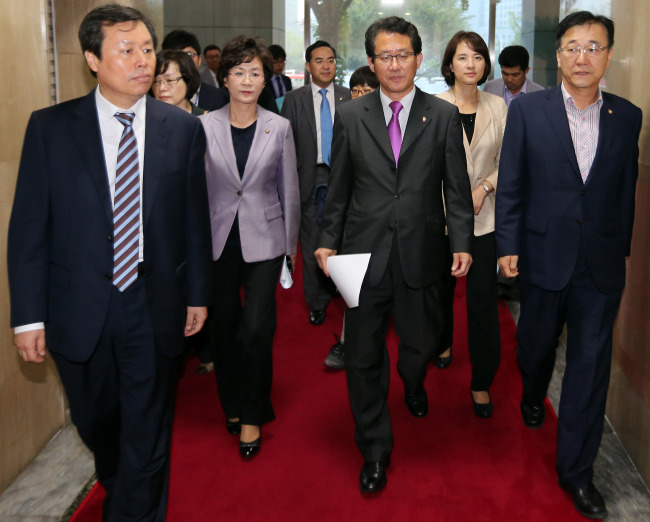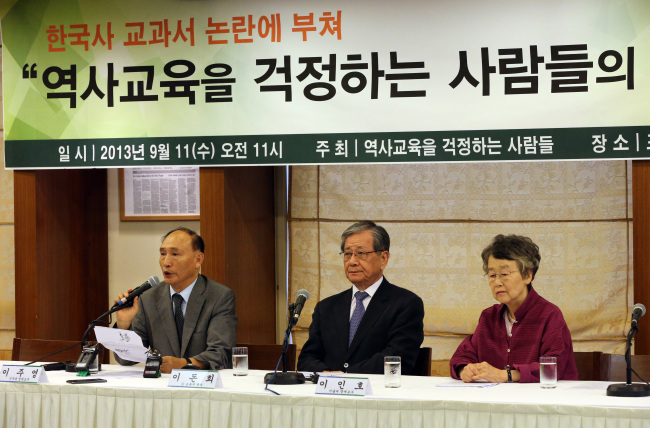Ministry to reexamine history textbooks
Controversy escalates over rightists’ version as progressives urge government to rescind authorization
By Korea HeraldPublished : Sept. 11, 2013 - 21:13
Education Minister Seo Nam-soo announced Wednesday that the ministry will reexamine all the eight recently approved history textbooks including one authored by conservative scholars.
His remark came as an academic debate over the text from Kyohak Publishing Co. is quickly spiraling into a political and ideological battle.
“Together with the National Institute of Korean History, the ministry will conduct an in-depth analysis of the textbooks and, if necessary, will complete revision and supplementation by the end of October after consultations with the expert panel formed by the institute and publishing companies,” he told a news conference.
The minister declined to comment on progressive scholars’ request to cancel the authorization of the book.
“We‘re only looking into factual errors, not the historical view,” he said.
The publication is among eight textbooks on Korean history approved on Aug. 30 by the institute commissioned by the Ministry of Education. They will be used in high schools from next year.
Progressives have accused the book of expressing slanted views, distortions, errors and plagiarism.
Its authors and conservatives call it a major fix to the “defeatist and self-deprecating” views that they see dominating history education.
The dispute centers on its depictions of modern history including Japan’s colonial rule (1910-1945), a succession of authoritarian governments and the people’s pro-democracy movements.
His remark came as an academic debate over the text from Kyohak Publishing Co. is quickly spiraling into a political and ideological battle.
“Together with the National Institute of Korean History, the ministry will conduct an in-depth analysis of the textbooks and, if necessary, will complete revision and supplementation by the end of October after consultations with the expert panel formed by the institute and publishing companies,” he told a news conference.
The minister declined to comment on progressive scholars’ request to cancel the authorization of the book.
“We‘re only looking into factual errors, not the historical view,” he said.
The publication is among eight textbooks on Korean history approved on Aug. 30 by the institute commissioned by the Ministry of Education. They will be used in high schools from next year.
Progressives have accused the book of expressing slanted views, distortions, errors and plagiarism.
Its authors and conservatives call it a major fix to the “defeatist and self-deprecating” views that they see dominating history education.
The dispute centers on its depictions of modern history including Japan’s colonial rule (1910-1945), a succession of authoritarian governments and the people’s pro-democracy movements.

“The textbook contains errors, plagiarized materials and distorted historical facts. It doesn’t meet the criteria for approval,” Rep. Yoo Ki-hong of the opposition Democratic Party said in a statement.
He led a group of DP lawmakers in protest on Wednesday at the Ministry of Education.
“We urge the (textbook’s) immediate cancellation. We will take legal action if the education minister refuses to do so.”
Five progressive history research groups on Tuesday issued a statement pointing out a number of incorrect statements and crucial omissions in the text.
The critics were especially angered by its failure to depict Japan’s cruelties during the colonial period and by its alleged recognition of Japan’s contribution to Korea’s modernization and failure.
For example, in describing the living conditions of that time in Gyeongseong, today’s Seoul, the textbook reads: “The residential areas were separated between Korean and Japanese people during the time. Most Koreans resided to the north of Cheonggyecheon Stream, while the Japanese lived to the south.”
“It doesn’t mention the fact that Imperial Japan forced out Koreans to build a new town in Seoul (south of the stream),” Rep. Yoo said.
He pointed out that one of the other textbooks states: “Gyeongseong’s development was focused on Japanese residential areas, and Koreans faced racial discrimination.”
Regarding Japan’s sex slavery of Korean women, the textbook says that Korean women started to work in military factories after Japan announced a law on female labor in 1944, and some women were “sacrificed as comfort women for the Japanese military.” But former comfort women have testified that Japan’s sex slavery had occurred nationwide since the 1930s.
The book may mislead students to think that the comfort women issue was just something that happened to some women who worked in military factories, the critics say.
The textbook also contains revisionist views on Korean presidents and political events since the establishment of the republic in 1948.
Critics charge that the book underestimates the pro-democracy movements. For instance, the Gwangju Democratic Movement on May 18, 1980, is termed a “riot.”
“On May 18 in Gwangju, students held a demonstration, calling for democracy. But when the martial law army entered the city, it turned into a bloody clash and some of the protesters were armed and took over the provincial office,” it reads.
Regarding the April 3 Jeju Uprising in 1948 against the establishment of a separate government in South Korea, it reads, “There was a riot against holding separate elections, and people attacked police stations and public offices. Some innocent people were killed while resolving the situation.”
But there is no clear mention of the catastrophic civilian casualties caused during the uprising, critics say.
Experts also point out several technical errors. In the caption to the photograph of West German Chancellor Willy Brandt kneeling before a monument to victims of the Warsaw Ghetto in 1970, it miswrote that it was taken in 1966.
“We found more than 58 percent of photos in the book are from Internet portals such as Google and Naver,” Rep. Kim Tae-nyeon of the DP said, claiming that the book paraphrased content and used photographs without citing the source of the material.
While Kyohak Company declined to comment on the criticism, the opposition lawmakers call for the NIKH head Lee Tae-jin to resign over the textbook controversy.
One of the coauthors claims that the book has been the target of attacks from progressive historians and lawmakers simply because it was written by conservative historians.
“We try not to evaluate or make any value of past historical events, but to write factual things,” coauthor Lee Myung-hee, professor of history at Kongju National University, told The Korea Herald.
The six-member writing panel for the book includes Lee and Kwon Hee-young, the current and former presidents of the Association for Contemporary Korean History, respectively.
The association, described as an organization of “New Right” historians, was set up in 2011, pledging to “fix biased research and education led by progressive historians.”
Asked about the description of Japan’s colonial rule, Lee admitted that the new textbook does detail some of the “achievements” from the colonial period, such as a “modern public school system and industrial infrastructure,” which he said were neglected in previous textbooks.
“The education, media and publishing business are dominated by the progressives. We should act more consciously (against them),” Lee said during a forum hosted by the ruling Saenuri Party on Wednesday.

A group of senior educators and historians defended the Kyohak textbook, saying the progressives should stop their ideologically driven attacks.
“They denounce the book because the authors have a different view of history from the people who have dominated our history books over the past decade,” the 23-member panel, including seven former education ministers, said in a statement.
“We believe there is no problem with using the book at schools as it passed the screening process.”
The process of approving textbooks has sparked controversy repeatedly since 2003, when the government first allowed private publishers to publish history textbooks. Before that, schools could only use state-authorized history textbooks. It is now up to each high school to select from listed books by the screening committee.
By Oh Kyu-wook (596story@heraldcorp.com)
-
Articles by Korea Herald







![[Graphic News] More Koreans say they plan long-distance trips this year](http://res.heraldm.com/phpwas/restmb_idxmake.php?idx=644&simg=/content/image/2024/04/17/20240417050828_0.gif&u=)
![[KH Explains] Hyundai's full hybrid edge to pay off amid slow transition to pure EVs](http://res.heraldm.com/phpwas/restmb_idxmake.php?idx=644&simg=/content/image/2024/04/18/20240418050645_0.jpg&u=20240419100350)






![[From the Scene] Monks, Buddhists hail return of remains of Buddhas](http://res.heraldm.com/phpwas/restmb_idxmake.php?idx=652&simg=/content/image/2024/04/19/20240419050617_0.jpg&u=20240419175937)

![[KH Explains] Hyundai's full hybrid edge to pay off amid slow transition to pure EVs](http://res.heraldm.com/phpwas/restmb_idxmake.php?idx=652&simg=/content/image/2024/04/18/20240418050645_0.jpg&u=20240419100350)

![[Today’s K-pop] Illit drops debut single remix](http://res.heraldm.com/phpwas/restmb_idxmake.php?idx=642&simg=/content/image/2024/04/19/20240419050612_0.jpg&u=)